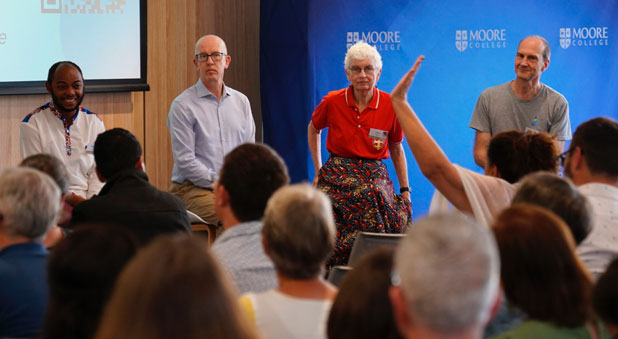In the south of Madagascar, a woman is married with three teenage children. Famine has struck her area and they must move 78 kilometres north.
They cut trees and make charcoal, which they then sell. They spend this little income on their daily food. They live far from a well, so do not wash their hands, face or body with water. Her husband leaves her with the children in order to find help. He dies on the journey. She is so weak from hunger, and her children are so weak as well, that they all die on the same day.
“That is only one family, but many families [like this] died during the famine... The question is, how does that affect gospel proclamation?” This is the question the Rev Berthier Lainirina asked almost 200 people at Anglican Aid’s Social Justice Reframed conference in September.
The Malagasy minister knows first hand what it is to lose everything for the sake of the gospel, and what it is like to preach Christ to those who hunger, thirst and suffer daily.
Preaching Christ amid poverty and persecution
The Social Justice Reframed conference saw people from more than 65 churches gather, sit under God’s word and hear how they could share the good news of the gospel with those who are vulnerable and suffering.
“Responding to poverty is vital but complicated, but the Bible provides real hope,” said the CEO of Anglican Aid, the Rev Canon Tim Swan, “The message of Jesus Christ is truly good news for the poor, as the church seeks to love her neighbour through relationship and generosity. Our care for the poor, motivated by the character and activity of God, is non-negotiable.”
The Rev Dr Ed Loane,visiting church history lecturer at Moore College, said at the event that there is a rich history of key evangelical leaders being involved in social justice as an outworking of their faith. Many government welfare activities and initiatives have been influenced by committed Christians, such as education, prison reform, abolition of slavery, and even fair work acts and laws.
“Keep the gospel central, keep reading your Bible, which helps shape how we live our lives,” Dr Loane said. “If we keep the Bible’s focus on what it means to be a Christian, we’ll do better [at caring for the poor].”
Acts of mercy and compassion
Serving on the ground in Madagascar, Mr Lainirina emphasised the need for a holistic ministry that combines meeting physical and spiritual needs. “What would you have done if you were in such a context that people are dying?” he asked. “Would we just tell them, ‘Be well, you will go to heaven’, or will we do something?”
Mr Lainirina and the Anglican Church in Madagascar have been delivering food relief packages in partnership with Anglican Aid. This has opened opportunities to share the hope of Jesus with many, and see many come into the kingdom.
With rapid church growth, intense discipleship is required to ensure people’s hope is anchored solely in the gospel. “We have to teach them that while Christians have provided food now, they have to follow Jesus forever,” he said. “Social help and theological education go together.”
Mr Swan prayed that the conference delegates would take this message back to their congregations, and that many would be motivated to serve those suffering. “We pray that there will be more biblically grounded discussion in our churches about caring for the poor and that this results in a renewed outpouring of generosity and prayer that reflect our great God’s overflowing grace and mercy.”























